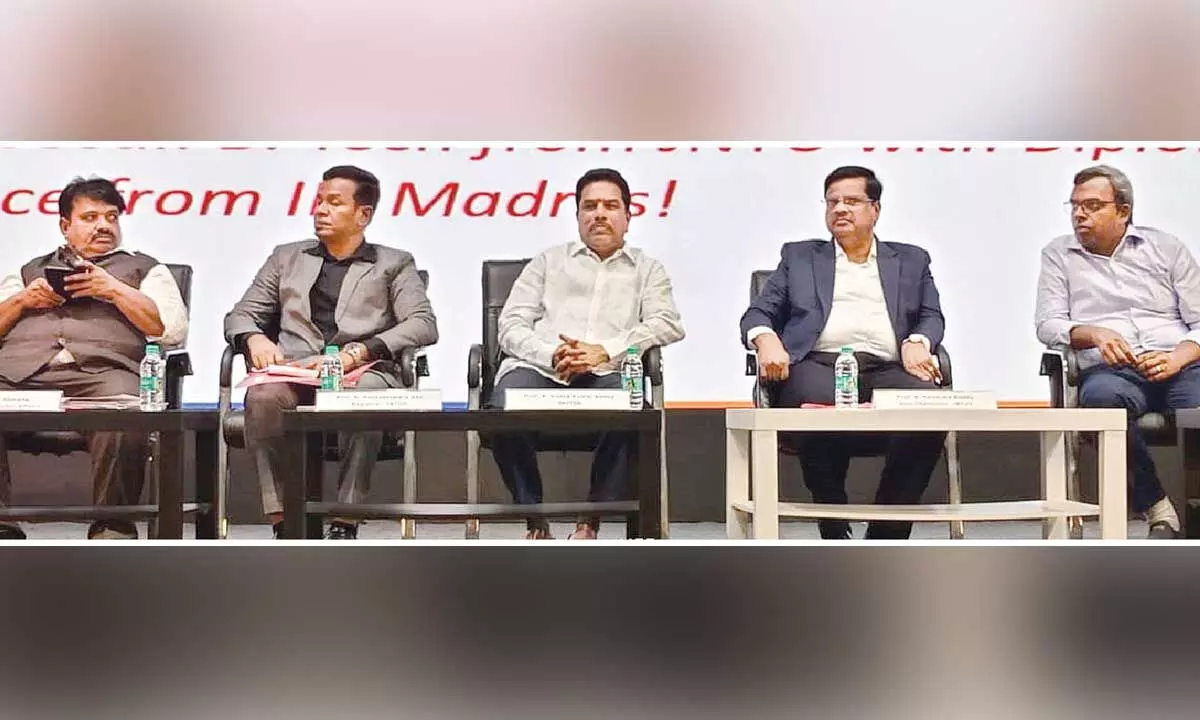Two-day meet held on bridging gap beween industry, academia

- Focuses on next generation workforce for innovation
- Workshop on designing curriculum and course structure for UG Engineering programme organised
Hyderabad: A two-day event was held on January 7 and 8 to address the gaps between industry and academia and their impact on creating a skilled workforce in today's world.
On January 7, IIT Madras, in collaboration with the Telangana Council of Higher Education (TGCHE), organised an industry-academia conclave in Hyderabad focusing on educating and training the next-generation workforce for innovation.
TGCHE Chairman Prof Balakista Reddy emphasised integrating technology with education. He noted extensive opportunities to explore in the wake of liberalisation and the privatisation of education. The surge in digitalisation and the experiences from the pandemic have led to what he termed “Civilisation”, which has significantly influenced industry and academia. He concluded by stating that state-controlled industries have been replaced by private enterprises, resulting in a surge of innovation, extending from deep sea to outer space.
Prof Pratap Haridoss, Dean (Academics) at IIT Madras, acknowledged the existing gaps between industry and academia and expressed the importance of bridging those gaps.
Prasanth Nandella, President of the Hyderabad Software Enterprises Association, called for the creation of groundbreaking solutions and stressed the need for faculty members to understand the industry's requirements while redesigning student learning skills. This was followed by a panel discussion featuring experts from both industry and academia, including Srividya Ramakrishnan, Head of R&D for Drug Substance at Aurigene Pharmaceutical Services Ltd, Sajjad Ahmed Shaik, Global Head of Learning for Insights & Data unit at Capgemini, Prof Prathap Haridoss, Dean (Academic Courses), IIT Madras, Naga Bharath Daka, Co-Founder and Chief Operating Officer of Skyroot Aerospace, Prashanth Nandella, President of Hyderabad Software Enterprises Association, Prof Vignesh Muthuvijayan (moderator), Associate Chair of the Centre of Outreach and Digital Education at IIT Madras.
The panel discussion covered various issues, with the panellists discussing the state of education in India's technical institutions, the challenges of breaking conventional pedagogies, industry requirements, and the difficulties in investing in R&D, which could be addressed by involving students in research projects.
The topic of the workshop during the second day was on designing the curriculum and course structure for the UG Engineering Programme held at Jawaharlal Nehru Technological University (JNTUH), Hyderabad, to review the existing curriculum. The speakers were – Prof NV Ramana, Director, DAAF, JNTUH, Prof V Balakista Reddy, Chairman, TGCHE & Vice-Chancellor, JNTUH, Prof K Vijaya Kumar Reddy, Rector, JNTUH, Prof K Venkateswara Rao, Registrar, JNTUH, Prof Pratap Haridoss, Dean (Academic Courses), IIT Madras, Prof Andrew Thangaraj, Chair, Centre for Outreach and Digital Education (CODE), IIT Madras Later, Dr Amit Dutta, Director of AICTE, New Delhi, who spoke on the AICTE initiatives and support systems for enhancing and maintaining quality in engineering education. Dr Sandhya Chintala, Executive Director of the IT-ITeS Skills Council and Vice President of NASSCOM, addressed stakeholders about education and training for the next generation workforce. Colonel Sai Shankar, P.VSM (Retd), Technical Manager for the National Quantum Mission, provided an overview of quantum technologies and relevant courses for academic institutions. Prof Andrew Thangaraj apprised the audience about IIT Madras' initiatives on learning and teaching resources embedded with digital education and skill training.
Dr NV Ramana shared insights into the course structure, credit distribution, and best practices at JNTUH, while Dr JP Tegar, Professor of Civil & Environmental Engineering at the National Institute of Technical Teachers' Training and Research in Bhopal, discussed the futuristic curriculum of UG engineering programmes, design and development considerations.








